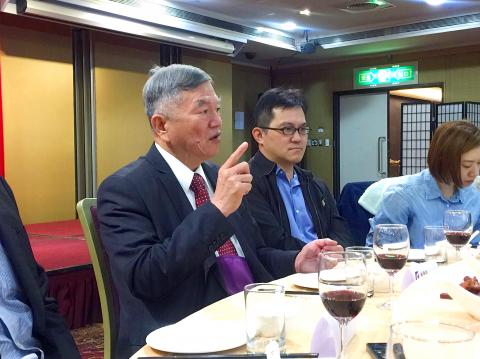The Fair Trade Commission (FTC) yesterday approved Qualcomm Inc’s application to pay a NT$23.4 billion (US$798.6 million) fine for breaching the nation’s antitrust regulations in 60 installments.
The US company would pay about NT$390 million in each installment, with the first installment due at the end of this month, the commission said.
The payment plan was approved out of consideration for Qualcomm’s need to reserve enough funds to sustain its operations, and because the penalty is the largest since the FTC’s inception in 1992, the commission said.

Photo: Lin Chin-hua, Taipei Times
Qualcomm has also backed its promise to pay the fine with promissory notes, the commission added.
The massive fine was handed to Qualcomm in October last year following a two-year investigation by the commission, which resulted in a ruling that the company had hampered market competition by using its position as the world’s largest handset chip designer to manipulate prices.
Handsets are one of the most important aspects of the nation’s export-oriented technology sector and Qualcomm’s actions had affected the entire supply chain, the commission said.
In particular, Qualcomm had leveraged its patent portfolio in radio communication technology standards to pressure local suppliers, who were often forced into unfavorable licensing deals, the commission said.
Qualcomm holds key patents in all major networking standards, including code-division multiple access, wideband code division multiple access and long-term evolution.
The commission estimated that during the seven years of unfair practices between 2005 and 2015, local suppliers had paid about NT$400 billion in licensing fees and purchased US$30 billion worth of baseband radio processors from Qualcomm.
The Ministry of Economic Affairs would not comment on the Qualcomm case, as it respects the commission’s decision, Minister of Economic Affairs Shen Jong-chin (沈榮津) said yesterday.
“To maintain the nation’s economic growth, industry development cannot be halted by fair-trade measures,” Shen told reporters ahead of the FTC’s approval of Qualcomm’s installment payment plan.
The ministry wants to maintain a close relationship with Qualcomm in terms of 5G technology development in Taiwan, he said.
Separately, the EU yesterday hit Qualcomm with an antitrust fine of 997 million euros (US$1.2 billion) for paying Apple Inc to exclusively use its chips in iPhones and iPads.
EU Commissioner for Competition Margrethe Vestager said that by striking the agreement with Apple in 2011, Qualcomm had “abused its market dominance” to unfairly shut out rival chipmakers such as Intel Corp, thus denying choice to consumers.
“Between 2011 and 2016, Qualcomm paid billions of US dollars to a key customer, Apple, and the payment was to prevent Apple to buy from rivals,” Vestager said.
“This meant that no rival could effectively challenge Qualcomm in this market, no matter how good their products were,” she added.
The Danish commissioner said that Qualcomm had “denied consumers and other companies more choice and innovation.”
Additional reporting by Lauly Li and AFP

INVESTIGATION: The case is the latest instance of a DPP figure being implicated in an espionage network accused of allegedly leaking information to Chinese intelligence Democratic Progressive Party (DPP) member Ho Jen-chieh (何仁傑) was detained and held incommunicado yesterday on suspicion of spying for China during his tenure as assistant to then-minister of foreign affairs Joseph Wu (吳釗燮). The Taipei District Prosecutors’ Office said Ho was implicated during its investigation into alleged spying activities by former Presidential Office consultant Wu Shang-yu (吳尚雨). Prosecutors said there is reason to believe Ho breached the National Security Act (國家安全法) by leaking classified Ministry of Foreign Affairs information to Chinese intelligence. Following interrogation, prosecutors petitioned the Taipei District Court to detain Ho, citing concerns over potential collusion or tampering of evidence. The

‘FORM OF PROTEST’: The German Institute Taipei said it was ‘shocked’ to see Nazi symbolism used in connection with political aims as it condemned the incident Sung Chien-liang (宋建樑), who led efforts to recall Democratic Progressive Party (DPP) Legislator Lee Kun-cheng (李坤城), was released on bail of NT$80,000 yesterday amid an outcry over a Nazi armband he wore to questioning the night before. Sung arrived at the New Taipei City District Prosecutors’ Office for questioning in a recall petition forgery case on Tuesday night wearing a red armband bearing a swastika, carrying a copy of Adolf Hitler’s Mein Kampf and giving a Nazi salute. Sung left the building at 1:15am without the armband and apparently covering the book with a coat. This is a serious international scandal and Chinese

Seventy percent of middle and elementary schools now conduct English classes entirely in English, the Ministry of Education said, as it encourages schools nationwide to adopt this practice Minister of Education (MOE) Cheng Ying-yao (鄭英耀) is scheduled to present a report on the government’s bilingual education policy to the Legislative Yuan’s Education and Culture Committee today. The report would outline strategies aimed at expanding access to education, reducing regional disparities and improving talent cultivation. Implementation of bilingual education policies has varied across local governments, occasionally drawing public criticism. For example, some schools have required teachers of non-English subjects to pass English proficiency

TRADE: The premier pledged safeguards on ‘Made in Taiwan’ labeling, anti-dumping measures and stricter export controls to strengthen its position in trade talks Products labeled “made in Taiwan” must be genuinely made in Taiwan, Premier Cho Jung-tai (卓榮泰) said yesterday, vowing to enforce strict safeguards against “origin laundering” and initiate anti-dumping investigations to prevent China dumping its products in Taiwan. Cho made the remarks in a discussion session with representatives from industries in Kaohsiung. In response to the US government’s recent announcement of “reciprocal” tariffs on its trading partners, President William Lai (賴清德) and Cho last week began a series of consultations with industry leaders nationwide to gather feedback and address concerns. Taiwanese and US officials held a videoconference on Friday evening to discuss the